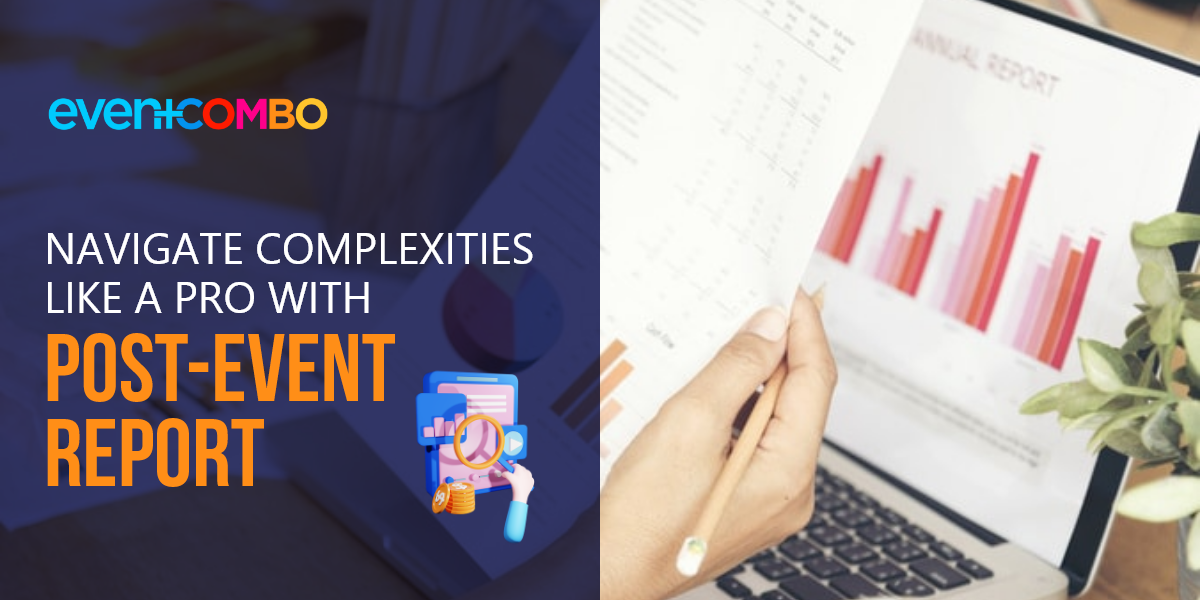

Analyzing the wins and hiccups faced before, during, and after the event is essential to getting a deeper picture of it. Event planners should know whether their time and investment have yielded the desired results. A post-event report is invaluable in helping you evaluate the performance and scope of improvement.
To create it, you need to first find sources of data about your event's performance and outcomes, compare it against the metrics you chose, and understand the impact. The report gives your stakeholders a detailed yet easy-to-understand snapshot of the event.
Keep reading as we explain its significance and exactly what element should be included in this report. Further, we will also explain the sources of data collection for actionable insights.
Benefits of Data-Driven Post-Event Report
Data is the backbone of personalized and profitable event experiences. A post-event report backed by sound analysis of data gained through technologies like event apps and event management platforms gives robust insights into streamlining operations, enhancing logistics, and refining future planning strategies.
Here are some major advantages of taking time out to plan a post-event report:
Effortlessly create a post-event report backed by valuable data using Eventcombo’s all-in-one event management solution.
What Goes into a Post-event Report?
Here's the structure that should be a part of your post-event report.
1. Basics of the Event
Begin by presenting the basic event details, such as the event name, date, venue, and overall purpose.
2. Executive Summary
A post-event summary is more descriptive. Here, you dive into what you could accomplish through the event. This section has quantitative data about the successes of your event. Majorly, you should include the following in the post-event report's summary:
3. How the Event Stacked up Against Your Metrics
Event metrics are indicators that help you gauge the success of your event. So, you should compare the event against the chosen metrics and present the result briefly in the post-event report. The crucial metrics to measure attendance and registration include:
4. Financial Overview
Give a detailed view of budget performance as it is essential for stakeholders to know. Break down the different categories of expenses like marketing, supplies, credit fees, venue booking, and income. Sources of event income include ticket packages, sponsorships, branded merchandise, upselling VIP experiences, digital advertising or career expo (in case of an industry-specific event).
PRO TIP: Infuse visuals in the form of charts, graphs, and tables to make the information easily digestible.
5. Attendee Profile
Ensuring attendees feel engaged is one of the major purposes of your event. There should be a separate section in the post-event report for details about attendees. These details include their demographics, preferences, and reasons for attending the event. You can further narrow it down to age, gender, and participants’ industry.
6. Promotional Strategies
Event promotion happens in many ways. From digital marketing, paid ads, and social media giveaways to offline promotion through sharing business cards, networking, or community engagement; there are many techniques. The post-event report should include the tactics you use to publicize the event and its effectiveness.
7. Feedback from the Attendees
Attendee feedback can be gleaned from post-event engagement activities like social media polls and surveys. Highlight the key trends you observe in the feedback and where your future events can be improved.
8. Actionable Recommendations
Create recommendations after thoroughly analyzing the results of the event. The points should clearly reveal the focus areas for improving future events. Your suggestions will enable your event planning team to create more holistic experiences, curate targeted marketing campaigns, and retain current sponsors. Ultimately, it will enable you to meet more of your short and long-term event goals.
How Do You Collect Data for Post-Event Report?
Post-event data analysis is crucial for writing a report. But what are the major sources for it? There are several ways to collect event data including:
Summing up
A post-event report is a comprehensive analysis of your event. Gaining access to the strengths and shortcomings of the event is a sure-shot way to improve further experiences and get tangible results. Eventcombo's event technology will assist you throughout the process of capturing crucial details. Powered by artificial intelligence (AI), our platform tracks different types of data, from registration, ticket sales, audience engagement, active sessions, networking, and more according to the metrics you define. The granular analytics facilitates effective post-event assessment, which, in turn, leads to more accurate and customized event planning. Book a demo today.

Every event organizer knows the sinking feeling of watching a well-planned budget unravel. That initial estimate of $400,000 suddenly balloons to $540,000 due to unexpected fees and overlooked expenses.

Eventbrite is a common name in the event management space, but if you’re here, chances are it isn’t checking all your boxes. Like many professionals, you may be looking for Eventbrite alternatives or exploring...

Networking events remain the backbone of professional growth, whether you're building a business, recruiting talent, generating leads, or seeking strategic partnerships.